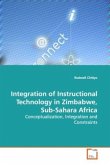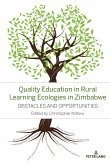In recent years research has tried to address factors that influence the African child's educational achievement. This book is a thick layer to the existing debate. Literacy and learning practices of children at home and school in rural Zimbabwe reveal some of these reasons. Critical and auto-ethnographic methodologies are employed to gain insight into the lives of rural communities in order to identify the underlying causes of poor educational achievement. Application of a number of theoretical perspectives expose underlying negative coercive relations of power in the community, the need for greater appreciation of the embeddedness of larger social practices in pedagogic enterprise and the fact that issues of language, education and culture tend to conceal relations of domination and subordination in the schooling system. This fresh approach, methodology and debate should be of great interest to university students, teachers college students, researchers, university and college lecturers as well as education policy makers and teachers of English as a second language in Sub- Saharan Africa.
Bitte wählen Sie Ihr Anliegen aus.
Rechnungen
Retourenschein anfordern
Bestellstatus
Storno








